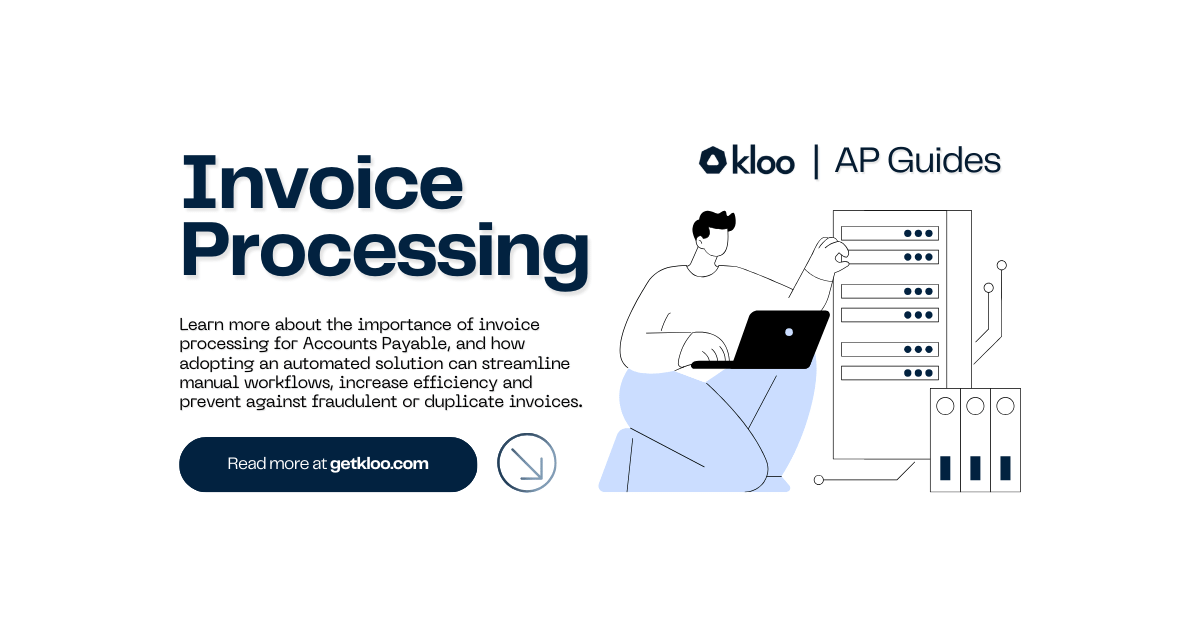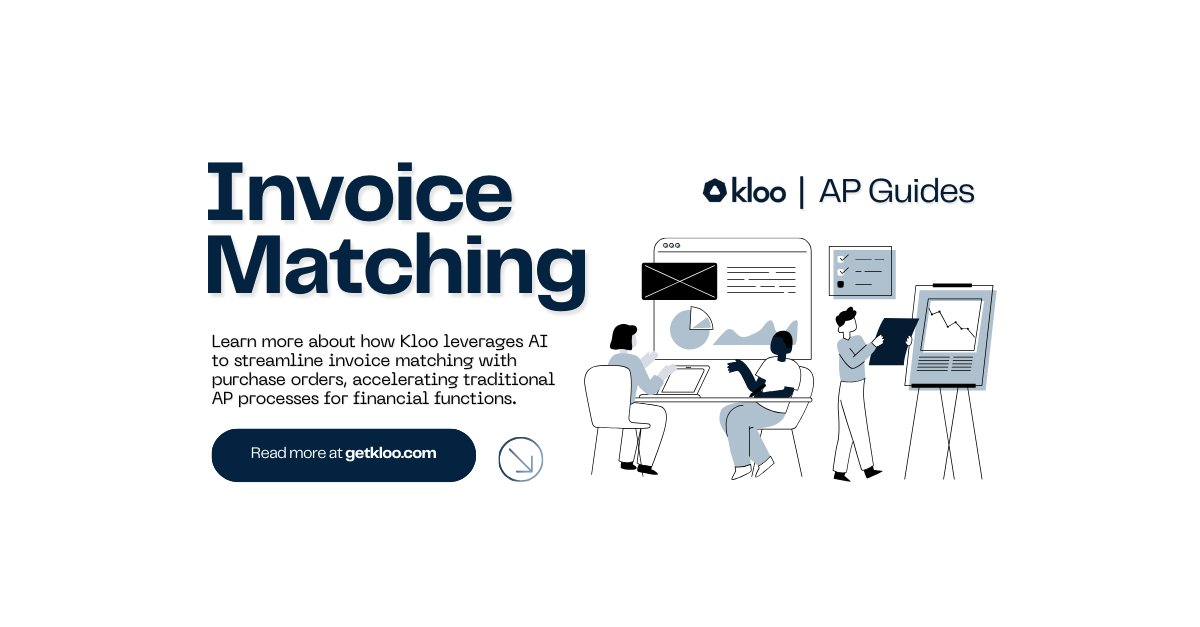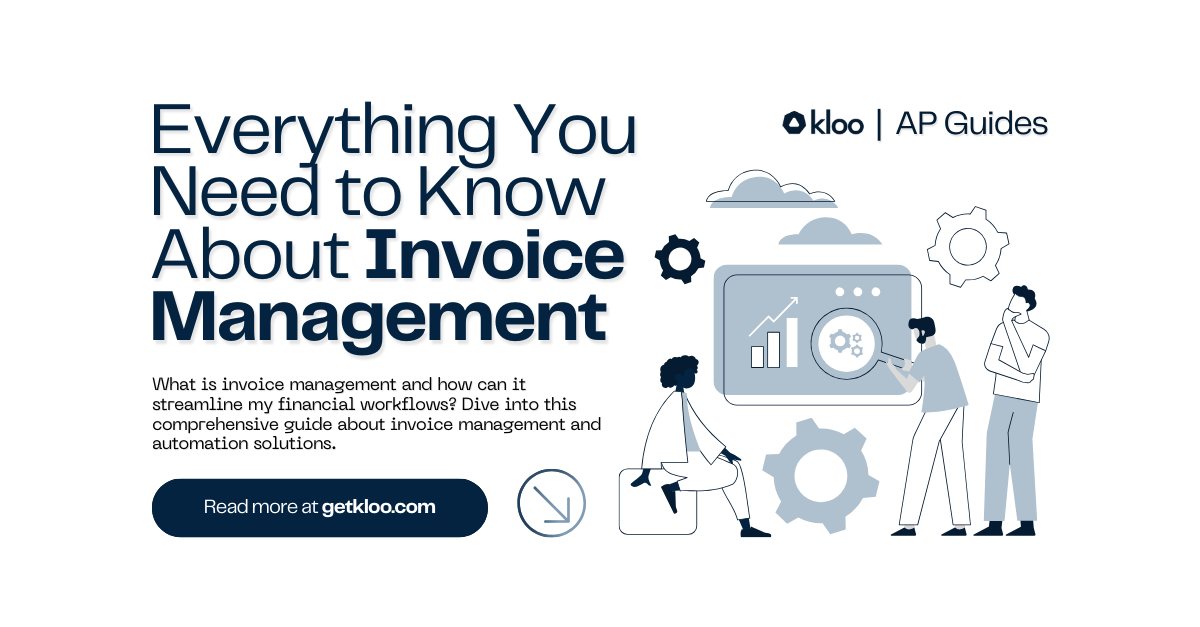
Invoice Matching: Everything You Need to Know

Invoice matching is a key function of invoice management and a crucial part of the Accounts Payable process. Traditional approaches in this key task may cost time, effort, and human resources to a business. Using innovative technologies and automation can optimise invoice matching to provide extra leverage and value to a business. Learn more about why invoice matching is important for financial operations and how Kloo integrates AI and smart automation to streamline your invoice matching processes.
Contents:
- What is invoice matching?
- What's the difference between 2- and 3-way matching?
- How to automate matching?
- Benefits of automated matching
- How Kloo automates invoice matching
What is Invoice Matching?
Invoice matching, sometimes referred to as PO matching, is a crucial component of a company's accounts payable (AP) operations, guaranteeing that payments are issued solely for goods or services that have been accurately delivered and recorded. This vital verification step safeguards against overpayments, fraudulent activities, and transactional mistakes, upholding accuracy and healthy supplier relationships. Effective invoice matching confirms that transactions comply with the terms originally agreed upon, maintaining strong financial control over procurement.
Why is Invoice Matching Important?
Let’s find out why verifying or matching invoices is so important for a business.
Invoice matching ensures that vendor invoices can be verified against supporting documents before releasing payments. This helps businesses across a variety of functions, including:
- Confirming that payments are made only for valid goods or services received from the vendor
- Maintaining faster and accurate releases of payments
- Facilitating better transparency by eliminating errors and double payments
- Tracking records of payments for multiple vendors
- Ensuring preparedness for company audits
2-Way vs 3-Way Invoice Matching: Understanding the Difference
When it comes to invoice matching, businesses can choose between two primary methods: 2-way and 3-way matching, each offering specific advantages depending on the complexity and needs of the business.
- 2-Way Matching: This process is the simpler of the two, involving the comparison of the purchase order and the invoice. It checks that the payment request on the invoice matches the original order in terms of price and quantity. This method is typically used by businesses with straightforward procurement processes or where the risk of incorrect deliveries is low.
- 3-Way Matching: Adding an additional layer of security, 3-way matching compares three documents: the purchase order, the invoice, and the receiving report. This method confirms that the goods or services billed were actually delivered as expected before payment is issued.
Both methods aim to streamline payment processes and enhance financial accuracy. However, choosing the right method depends on the specific control and security requirements of the business.
How to Automate Invoice Matching
Automating the invoice matching process is a crucial step for businesses looking to enhance the efficiency and accuracy of their AP operations. As companies grow, the volume of transactions increases, making manual matching increasingly impractical and prone to errors. Automation not only streamlines the process but also significantly reduces the risk of overpayments and fraud, ensuring financial integrity and robust vendor relationships.
Rules-Based Matching
Rules-based automation utilises a predefined set of parameters to match invoices to purchase orders. This system checks for exact matches in price, quantity, and item description, and is very effective for straightforward, repetitive transactions. However, it can falter when faced with data inconsistencies, such as minor discrepancies in vendor names or product descriptions, often leading to the need for manual review.
AI-Powered Matching
AI-powered context automation takes a more sophisticated approach by employing technologies such as machine learning and natural language processing. This allows the system to understand and interpret nuances in data, accommodating minor discrepancies that would typically trip up a rules-based system. For example, AI can recognise that "Match Co." and "Match Company" refer to the same vendor, eliminating the need for manual interventions and keeping the automation flow intact.
Implementation Strategy
Automated matching tools are generally part of a broader AP automation software. This toolkit should integrate seamlessly with your existing ERP or accounting system, enabling two-way data sharing. Here’s how to ensure a smooth integration:
-
Select a Compatible Tool: Choose an invoice matching solution that is compatible with your current ERP system to ensure smooth data exchange and minimal disruption to existing processes. You can read our full guide to automated matching software here.
- Choose an AI-Powered Tool: Solutions that harness AI require far less manual admin than rules-based solutions so scale effortlessly with your organisation.
-
Data Consistency: Maintain the ERP system as the single source of truth. The automated matching tool should not only extract data from the ERP but also feedback validated data to maintain consistency and accuracy across all financial records.
By following these steps, businesses can successfully automate their invoice matching processes, resulting in more efficient, accurate, and reliable AP operations. This not only saves time and reduces errors but also enhances overall financial control.
Benefits of Automated Invoice Matching
Automating invoice matching helps with the easier processing of invoices for payments. With the need for human intervention eliminated, the complications of maintaining paperwork and manual validations are also ruled out.
Some of the notable benefits offered by touchless invoice processing are:
- Efficiency: Manual invoice matching is tedious and time-consuming. Checking invoice details individually and validating with 2-, 3-, or 4-way processes takes a considerable amount of time. Hence, it allows company employees to dedicate their valuable time to other key tasks and improve overall productivity.
- Mitigate against duplicate and fraudulent invoices: Automating invoice matching entails consistent validation between invoices and supporting documents. Any suspicious invoices can be detected and flagged for manual verification. This ensures protection against fraudulent or duplicate invoices, without the risk of human error.
- Promotes Strong Vendor Relationships: Automating invoice processing can quickly match invoices with purchase orders and expedite faster payment to vendors to keep them satisfied. In turn, the business can also benefit from better contract offers and early payment discounts for increased profitability.
- Audit Preparedness: Invoices with other supporting documents are mandatory for audits. Using automated invoice matching ensures purchase orders, goods receipts, inspection slips, and invoices are available in a digitally centralised location that can be accessed easily during audits to expedite the process.
How Kloo Automates Invoice Matching
Kloo is at the forefront of transforming accounts payable processes with its advanced invoice matching automation. Our approach combines cutting-edge technologies to enhance the efficiency, accuracy, and security of invoice processing. Here's how Kloo streamlines the process:
-
Automated Invoice Uploads: Kloo utilises a sophisticated blend of Optical Character Recognition (OCR) and generative AI to automate the extraction and coding of data from invoices. Once an invoice is uploaded, either through direct upload or via email, the system immediately begins to parse and categorise the invoice details accurately. This not only speeds up the processing time but also reduces human errors significantly.
-
AI-Powered 2 or 3 Way Matching: Depending on the needs of the business, Kloo can perform both 2-way and 3-way matching using context-based AI. This means Kloo’s system is capable of understanding and interpreting subtle nuances in data, such as different vendor name formats or minor discrepancies in product listings. By applying context-based matching, Kloo ensures that even when documents do not perfectly align in format or terminology, the essential details match correctly, allowing for seamless verification and approval processes.
-
Flagging Suspicious, Fraudulent, or Duplicate Invoices: Kloo's system is equipped with advanced algorithms designed to detect and flag any invoices that appear suspicious, potentially fraudulent, or duplicate. This proactive measure significantly mitigates the risk of financial loss and enhances the control mechanisms within your financial operations. By alerting users to potential issues before payments are processed, Kloo provides an added layer of security and trust in your invoice processing.
- Seamless Integrations with Real-Time Data Sharing: Kloo is designed to integrate effortlessly with your existing ERP and accounting systems, enabling real-time data sharing. This integration ensures that data flows smoothly between systems, keeping your financial records consistent and up-to-date.
By integrating these technologies, Kloo not only simplifies the invoice matching process but also ensures it is more secure and less prone to errors. Companies using Kloo as an invoice management solution can expect a robust system that supports dynamic financial management, enabling them to focus on strategic business growth rather than manual financial administration.
Key Takeaways
Automating invoice matching is a critical advancement for maintaining the accuracy and efficiency of accounts payable processes. As businesses manage increasing volumes of transactions, the limitations of manual methods become apparent, making automation not just beneficial but essential. Through the adoption of Artificial Intelligence for smart automation, companies can streamline their financial workflows, markedly reduce error rates, and enhance fraud detection, thereby improving operational efficiency.
This transformation in invoice processing not only bolsters compliance and strengthens vendor relationships but also positions businesses to better handle scalability and financial governance. The strategic implementation of automated invoice matching systems is indispensable for any organisation aiming to optimise its financial operations and maintain a competitive edge in an evolving market landscape.
Let's get started

